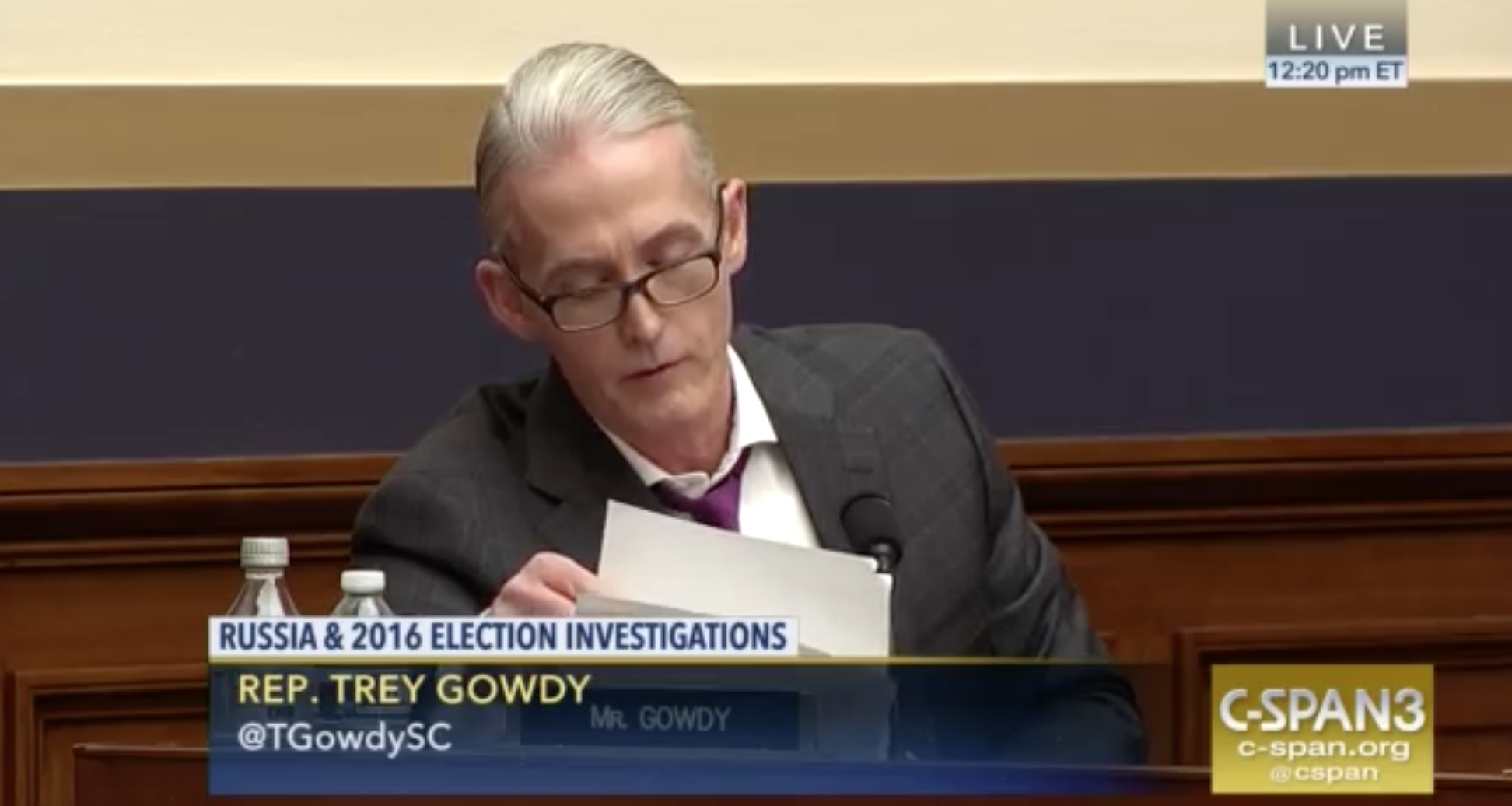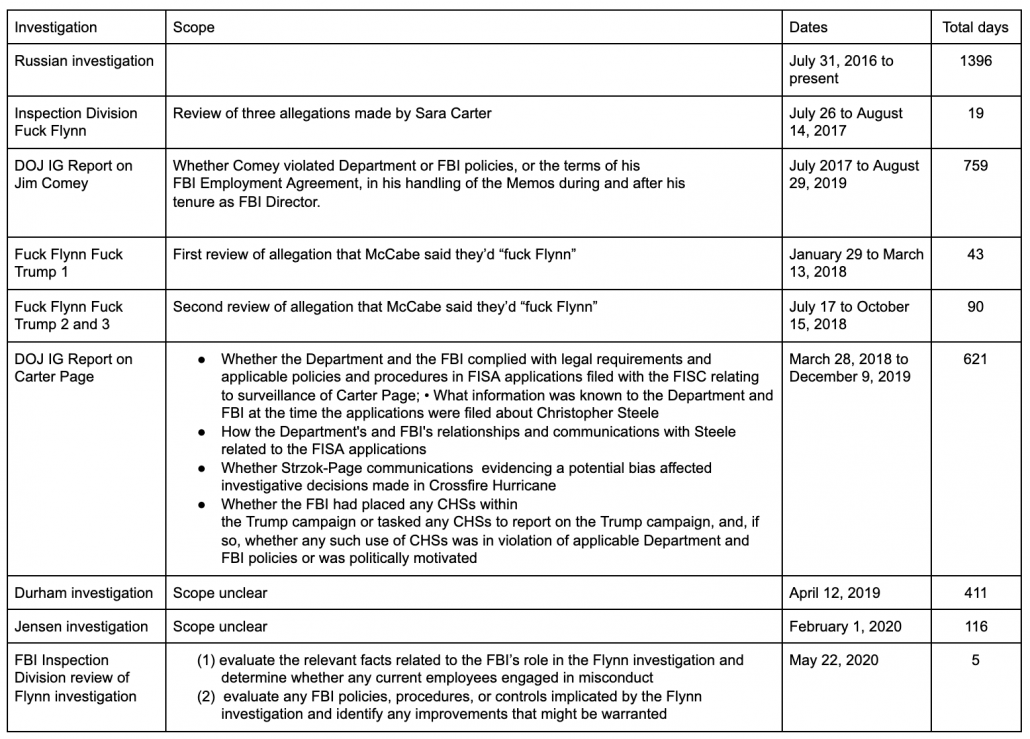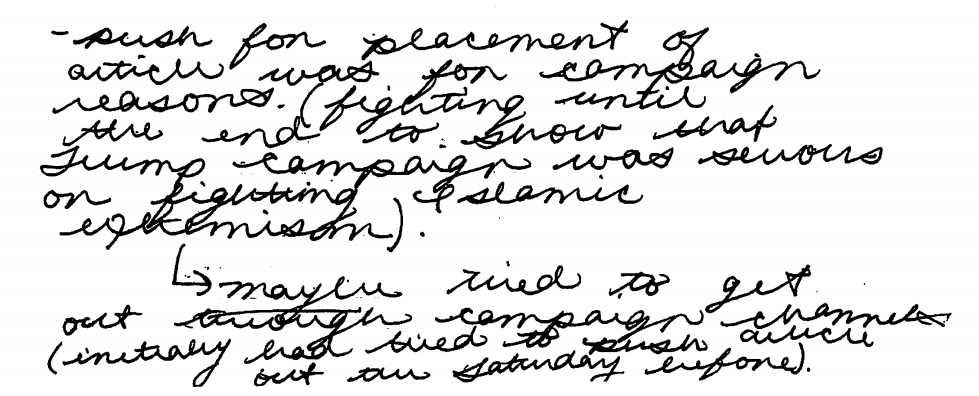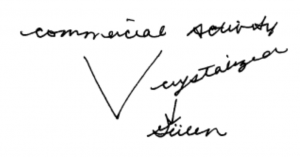Bill Barr’s DOJ has this to say about whether Mike Flynn’s lies to the FBI on January 24, 2017 were material.
It was material to the FBI’s counterintelligence investigation to know the full extent of the defendant’s communications with the Russian Ambassador, and why he lied to the FBI about those communications.
[snip]
The defendant’s false statements to the FBI were significant. When it interviewed the defendant, the FBI did not know the totality of what had occurred between the defendant and the Russians. Any effort to undermine the recently imposed sanctions, which were enacted to punish the Russian government for interfering in the 2016 election, could have been evidence of links or coordination between the Trump Campaign and Russia. Accordingly, determining the extent of the defendant’s actions, why the defendant took such actions, and at whose direction he took those actions, were critical to the FBI’s counterintelligence investigation.
[snip]
As the Court has already found, his false statements to the FBI were material, regardless of the FBI’s knowledge of the substance of any of his conversations with the Russian Ambassador. See Mem. Opinion at 51-52. The topic of sanctions went to the heart of the FBI’s counterintelligence investigation. Any effort to undermine those sanctions could have been evidence of links or coordination between the Trump Campaign and Russia.
You might be forgiven for believing that Bill Barr’s DOJ didn’t made a vigorous argument to Judge Emmet Sullivan that Flynn’s lies were material, one that remains active before Sullivan, because almost no coverage of recent events concerning Flynn accounts for the posture of the case, in which there are at least four pending decisions before Sullivan. Several of those active representations argue Flynn’s lies were material.
Instead, coverage claims that Bill Barr’s DOJ believes that Flynn’s lies were in no way material. It is true that, in a motion to dismiss the case submitted last week, Bill Barr’s DOJ argued the lies weren’t material.
The Government is not persuaded that the January 24, 2017 interview was conducted with a legitimate investigative basis and therefore does not believe Mr. Flynn’s statements were material even if untrue. Moreover, we not believe that the Government can prove either the relevant false statements or their materiality beyond a reasonable doubt.
[snip]
In any event, there was no question at the FBI as to the content of the calls; the FBI had in its possession word-for-word transcripts of the actual communications between Mr. Flynn and Mr. Kislyak. See Ex. 5 at 3; Ex. 13. at 3. With no dispute as to what was in fact said, there was no factual basis for the predication of a new counterintelligence investigation. Nor was there a justification or need to interview Mr. Flynn as to his own personal recollections of what had been said. Whatever gaps in his memory Mr. Flynn might or might not reveal upon an interview regurgitating the content of those calls would not have implicated legitimate counterintelligence interests or somehow exposed Mr. Flynn as beholden to Russia.
I know journalists are used to covering the Trump administration as a series of independent outrages, each one drowning out a prior newly inoperative one. But in courts, statements from a given party are presumed to have continuity, at least until those statements are resolved legally.
DOJ, generally, is assumed to have continuity in any proceeding, even between Administrations, and generally only changes position when the law or an interpretation of it changes, and as such would apply to all affected parties.
That’s all the more true within the span of one Administration. And in this case, Trump’s Acting Attorney General Rod Rosenstein agreed Flynn’s lies were material when he approved false statement charges against Flynn in December 2017, Trump’s Acting Attorney General Matt Whitaker’s DOJ argued Flynn’s lies were material when DOJ moved to sentencing in December 2018, Bill Barr’s DOJ argued “the FBI was engaged in a legitimate and significant investigation,” when it successfully defeated a request to dismiss the prosecution last fall, and Barr’s DOJ argued Flynn’s lies were material in January.
It is true that Barr’s DOJ has provided a claimed basis for changing its mind about the legitimacy of the investigation into Flynn and the materiality of the lies he told. It cites “newly discovered and disclosed information” as well as “recently declassified information.”
After a considered review of all the facts and circumstances of this case, including newly discovered and disclosed information appended to the defendant’s supplemental pleadings, ECF Nos. 181, 188-190,1 the Government has concluded that the interview of Mr. Flynn was untethered to, and unjustified by, the FBI’s counterintelligence investigation into Mr. Flynn—a no longer justifiably predicated investigation that the FBI had, in the Bureau’s own words, prepared to close because it had yielded an “absence of any derogatory information.”
1 This review not only included newly discovered and disclosed information, but also recently declassified information as well.
Not only is the reference to “newly declassified information” a tell that this information is claimed only to be new to Flynn, the motion to dismiss does none of the things legal filings are supposed to do to substantiate claims like this. There’s no declaration from Jeffrey Jensen describing the reasons for his review and explaining how, over three years into this investigation, he came to discover “new” information that hadn’t been considered by Rod Rosenstein and Matt Whitaker and Bill Barr or Robert Mueller and Jessie Liu when DOJ had previously argued this was a legitimate investigation. There’s no declaration from a Records Officer explaining how it is that the two files claimed to be new evaded anyone’s attention all these years and proving these documents hadn’t been reviewed by DOJ before. There’s not even a description in the filing specifying what it is that DOJ is claiming to be new, there’s just a citation to docket entries of stuff that was newly turned over to Flynn.
Plus, all of the facts on which this motion to dismiss relies — that the FBI hadn’t found anything in its counterintelligence investigation into Flynn, but decided to keep it open in early January 2017 when they discovered the Kislyak transcripts, and that people in DOJ and FBI had conflicting understandings of the status of the investigation leading up to the interview — has not only been known to DOJ but has been public since March 22, 2018, when Republicans released it in their Russian Report.
Director Comey testified that he authorized the closure of the CI investigation into General Flynn by late December 2016; however, the investigation was kept open due to the public discrepancy surrounding General Flynn’s communications with Ambassador Kislyak. [redacted] Deputy Director McCabe stated that, “we really had not substantiated anything particularly significant against General Flynn,” but did not recall that a closure was imminent.
[snip]
The Committee received conflicting testimony from Deputy Attorney General (DAG) Yates, Director Comey, Principal Deputy Assistant Attorney General McCord, and Deputy Director McCabe about whether the primary purpose of the interview was investigating potentially misleading statements to the Vice President, which the Vice President echoed publicly about the content of those calls; a possible violation of the Logan Act; or a desire to obtain more information as part of the counterintelligence investigation into General Flynn.
Sullivan knows well that DOJ knew of this information, because he litigated a long dispute over this information starting in August and wrote an opinion on it in December. He even reviewed two of the 302s the government relies heavily on — those of Mary McCord and Sally Yates — to make sure the summaries DOJ gave to Flynn were sufficient, which is pretty good proof that DOJ knew about them and their representations about the almost-closed investigation and the discussions about the multiple things FBI was investigating. Billy Barr claimed in his interview that this was new to him — something he has not done in a representation to the court — but then described just what appears in the passage from the HPSCI Report, something which was public (and circumstances to which he alluded in his confirmation hearing). In fact, FBI has gone on the record to say that these records had already been shared with DOJ IG (which completed a report in December that didn’t treat them as unusual) and the John Durham inquiry (which began a year ago).
With regard to certain documents in the Michael Flynn matter from the 2016-2017 time period that are now the subject of reporting by the press, the FBI previously produced those materials to the Inspector General and U.S. Attorney Durham,” the FBI said.
So these documents aren’t even new to oversight elements in DOJ outside of the prosecutorial team that argued for the materiality of this case. Because the documents are not new to DOJ, DOJ has offered no valid reason to flip-flop about its view on the legitimacy of the investigation and the materiality of Flynn’s lies.
All the more so given one more detail about this case. Before prosecutors submitted the sentencing memo in January that made an aggressive case for the legitimacy of the prosecution and the materiality of Flynn’s lies, they had to get two extensions to secure the necessary approvals. In December, prosecutors got a week extension for their sentencing memo to get approval from the “multiple individuals and entities” who would need to approve it.
There are multiple individuals and entities who must review and approve the government’s submission, including any changes from the government’s prior sentencing memorandum and its specific sentencing recommendations.
Then, on January 6, the government asked for and got one more day.
As the government represented in its initial motion, there are multiple individuals and entities who must review and approve the government’s submission, including any changes from the government’s prior sentencing memorandum and its specific sentencing recommendations. The government has worked assiduously over the holidays to complete this task, but we find that we require an additional 24 hours to do so. The government respectfully requests that this Court extend the government’s deadline to provide its supplemental sentencing memorandum to Tuesday, January 7, 2020, at 12:00 p.m.
Having twice granted extensions so prosecutors could be sure they got all the approvals they needed for their sentencing memorandum, and absent any claim since they didn’t secure those approvals, Judge Sullivan would be well-justified in treating that sentencing memorandum arguing forcefully for the legitimacy of the investigation into Flynn as the view of the entire DOJ, up to and including the Attorney General.
And since DOJ’s claims to have discovered “new” information since then are not supported by any proof and are in fact refuted by the public record, he has good reason to treat the earlier representations from Bill Barr’s DOJ as the operative one.
In Judge Sullivan’s court, Bill Barr’s DOJ’s claim that Flynn’s lies are material remains an active legal claim in support of sentencing, even while Bill Barr’s DOJ claims something entirely different in opposition to continuing the prosecution. Even Bill Barr has conceded that Judge Sullivan gets to decide whether to accept the motion to dismiss. If Sullivan rejects it, he can move immediately to sentencing, relying on Bill Barr’s DOJ’s argument that Flynn’s lies were material. Bill Barr is arguing with himself here.
Flynn’s supporters have started to argue that Sullivan’s appointment of John Gleeson conflicts with the recent SCOTUS decision in Sineneng-Smith which prohibits courts from seeking out opinions from parties not before the court to present issues that haven’t otherwise been presented.
One week ago, the U.S. Supreme Court issued a 9-0 decision, authored by Justice Ginsburg, that took judges to task for similar amicus antics. Her opinion for the Court in U.S. v. Sineneng-Smith upbraided the U.S. Court of Appeals for the Ninth Circuit for violating a basic aspect of legal proceedings called the “party presentation principle.” In a nutshell, this concept dictates that judges must decide the case as presented by the parties before them. They are not to go out questing for dragons to slay (or issues to tackle) that the parties have not brought before them. As J. Ginsburg put it: “[C]ourts are essentially passive instruments of government … They ‘do not, or should not, sally forth each day looking for wrongs to right. [They] wait for cases to come to [them], and when [cases arise, courts] normally decide only questions presented by the parties.”
That’s not what’s happening here. Judge Sullivan is asking Gleeson to argue the view of a party that remains before the court: that of DOJ, which argued in December 2017 and in December 2018 and in November 2019 and in January 2020 that Flynn’s lies are material and the prosecution just. The issues of materiality have been before the court since 2017, and DOJ has argued for the materiality of Flynn’s lies vigorously. I have no idea what Sullivan plans to do with respect to additional testimony. But even based on the public record as it exists today (not least because the motion to dismiss egregiously misrepresents the exhibits it relies on and in them, presented evidence that the purpose of the Flynn interview was clear), Gleeson could easily substantiate DOJ’s still active representation before Judge Sullivan’s court (in their still-pending sentencing memorandum) that Flynn was rightly prosecuted for material lies to the FBI.
Unlike Trump, Bill Barr doesn’t get to just ignore claims his own DOJ has made in the past. He can claim he has reason to reverse those claims, but there, too, Sullivan has discretion. DOJ would have to ask leave to modify its sentencing recommendation, and provide proof lacking here they have reason to do so. As it stands, however, DOJ has not asked to modify the sentencing recommendation, and thus their claims about materiality remain before Sullivan unchanged, sitting there in the docket right next to Bill Barr’s DOJ’s radically different claims.
There has been some shitty commentary presenting Bill Barr’s motion to withdraw as a Both-Sides issue, but totally misconstruing which are the two sides, claiming it pits DOJ against critics.
The Justice Department argues that the FBI shouldn’t have conducted its Jan. 24, 2017, interview of Flynn, because the bureau was already aware through phone intercepts of what he had discussed with the Russian ambassador and there wasn’t proper justification for continuing the investigation of Flynn. That request to dismiss, put forward by Attorney General William Barr, has been criticized by nearly 2,000 former Justice Department officials and hailed by Trump and his supporters.
But it totally misconstrues the two sides here. They are Bill Barr’s DOJ versus Bill Barr’s DOJ.
This is the rare opportunity where the kind of Both-Sides journalism the Beltway press loves to practice has merit. On one side, there’s Bill Barr’s DOJ, which has a currently active argument that Mike Flynn’s lies were material to a legitimate investigation. On the other side, there’s Bill Barr’s DOJ, which has a different argument (one that conflicts with the exhibits presented with it) that because there was no legitimate investigation at the time, Mike Flynn’s lies were not material.









